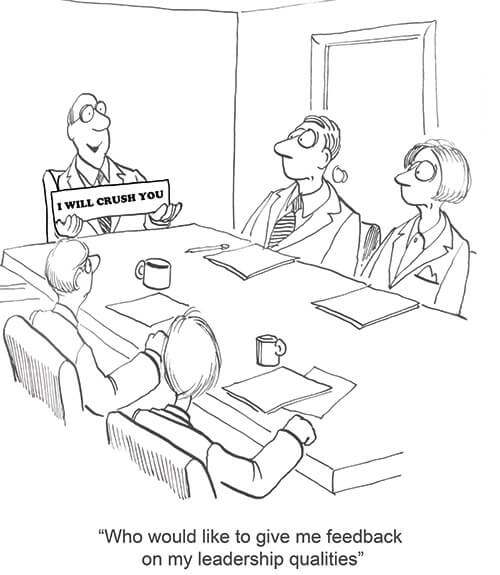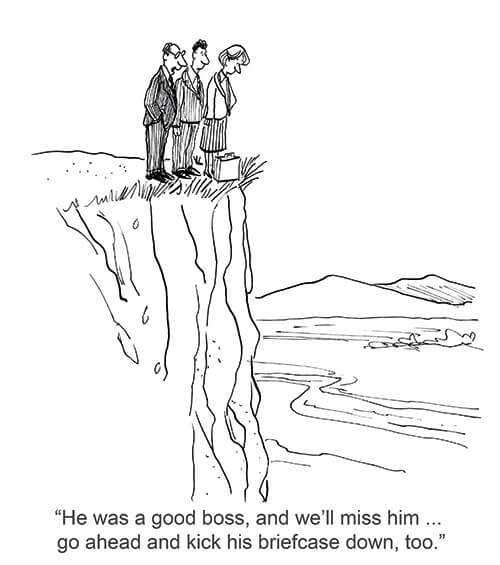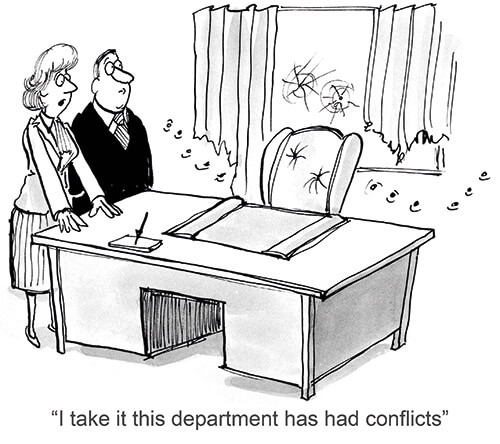Ever worked for the kind of boss who induces eye-rolling at every turn? Stymied by bickering bean-counters and bitchy co-workers? BV’s NAOMI SNELLING meets some experts in solving personal disputes in the workplace
VAST numbers of people have worked (or still work) in an environment where workplace politics require the negotiation skills of a top-ranking diplomat.

So, how do you spot the Enemy in the Office… and – quelle horreur – can they sometimes be found staring back at you in the mirror?
We’ve all met them: Mr/Ms “I-Know-Best”; the goalpost movers; the over-explainers, who drone on for so long they make you want to start eating your own fingers; the prophets of doom, for whom everything is a potential disaster.
Then there are the over-excitable enthusiasts who quickly crash and burn, leaving their colleagues to pick up the pieces. Oh, and let’s not forget the office gossip, Mr/Ms Smug, the office scatterbrain and your very own Moaning Myrtle, complete with tales of woe.
 Given the complex fabric of personalities that make up a workforce, it’s hardly surprising that tensions arise. The good news is that whether you’re dealing with low-level irritations or a more deep-rooted battle of the egos, there is plenty that can be done.
Given the complex fabric of personalities that make up a workforce, it’s hardly surprising that tensions arise. The good news is that whether you’re dealing with low-level irritations or a more deep-rooted battle of the egos, there is plenty that can be done.
Dave Morris, co-director of management and leadership consultancy Zentano, says that the way people are managed has a bearing on the quality of their work – and potentially determines their eventual decision to quit.
“We believe that although organisations can do quite well at spotting extreme and obvious bullying behaviours, sometimes more subtle manifestations of this are harder to spot but can still have hidden, costly effects,” says Morris.
“We believe that many people feel frustrated by the way they are managed.” The well-meaning manager who doesn’t delegate because of personal trust issues, or who is too quick to prove themselves to be the expert with advice or solutions, can cause real frustration.
“The hidden cost is that people eventually get fed-up and just leave,” says Morris. “The behaviour is not extreme enough to warrant a grievance procedure, and they don’t have the language and framework or support to challenge such behaviour.”
Because so much of this antagonism goes on below the surface, Morris points out that it will continue unchecked unless organisations are prepared to work at the deeper mind-set level with their leaders and managers, and challenge them.

“Leaders and managers cannot change what they are not aware of, unless they are given the psychological tools to do that,” he says. “Often organisations are not equipped to support and challenge their leaders and managers in that space.
“Most often this is because they themselves don’t have the language, models or tools to have the difficult conversations.”
Randall Peterson, Professor of Organisational Behaviour at the London Business School, recalls a difficult conversation he had with a highly ambitious boss who was unaware of his own intimidating demeanour.
“He was in a senior role at a well-known business school,” recalls Peterson. “I told him he was perceived as threatening and intimidating to a number of people.
“His response was typical incredulity: ‘I’ve never hit anyone, what are they worried about?’ I had to explain that he was a tall, large man with a temper, and that perception is reality when it comes to these sorts of things.

“He’s doing extremely well in his career, and he’s grateful that as a colleague I was brave enough to actually say something to him. I did it because he was somebody I respected, and I felt he deserved to know what some people thought. There was risk involved, but it actually strengthened our friendship in the end.”
Peterson points out one of the duties of a boss is to help resolve conflict. “We can find leadership and inspiration and training in lots of places, but when things blow up, too many bosses forget their key role and they run away from the conflict.
“It’s a dereliction of duty; when you have an enemy in the workplace you should be able to hope that your boss is going to engage and help to resolve it.”
And what exactly is an “enemy” anyway? “Enemies take the form of people who oppose what you would like to see happen,” says Peterson. “Sometimes you can be your own greatest enemy.
“An enemy can be a boss or a colleague. If it’s about outcomes, you can often go back to basics and work out where you have some agreement and then reconstruct.
“And the actual solution might be something that neither of you has focused on. If you escalate, and they escalate, in the end nobody wins.

“The best advice is to try to avoid it becoming a win-at-all-costs scenario, because that always ends up being dysfunctional, where you sell your soul to win a war.”
Morris and Peterson point out that self-awareness and emotional intelligence are the key marks of strong leaders.
“A key indicator of long-term success in leadership and management roles is the ability to seek out feedback, particularly the negative stuff,” says Peterson.
The good news is that having an enemy in the office can be a trajectory towards remarkable self-development.
Experts, including Peterson and Morris, agree that there is a whole arsenal of options to deal with the personal problems in the workplace, the most powerful of which involves developing your own leadership abilities.
Not only will this help you conquer enemies within and without, it has the potential to turbo-charge all areas of your life.




























